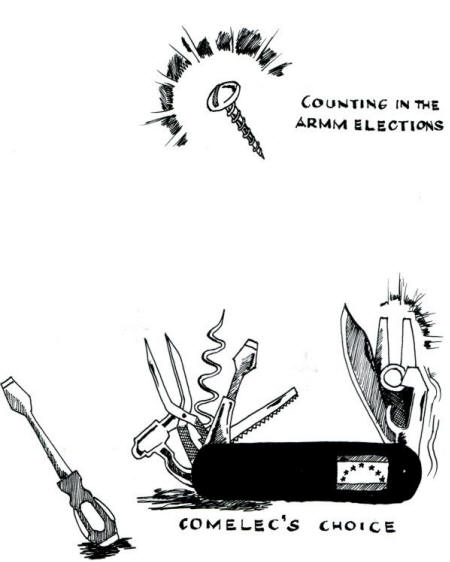| |
.
. |
|
Comelec
wants to automate ARMM elections using PCOS
|
|
from
NAMFREL Election Monitor Vol.2, No.10
|
|
. |
The Comelec en banc has reportedly decided
to adopt the PCOS machine and the OMR technology to automate the
ARMM elections. The polls tentatively scheduled for August, would
involve only a small number of candidates vying for governor,
vice-governor, and assemblyman posts in the five province of the
autonomous region. The en banc supposedly voted 6-1 in favor of the
automation using the PCOS, with only Commissioner Augusto Lagman
maintaining that the ARMM elections should be automated using
another technology. The
Comelec has not publicly released any resolution on this matter.
In previous months the House Committee on Suffrage, IT, civil
society, Comelec Advisory Council and election monitoring
organizations have called to forego the use of the PCOS technology
in succeeding elections due to unresolved technical and systems
issues. Proposals for the ARMM have been made for an all manual
election or conduct the polls in a manual voting and/or count but
automating the transmission and canvassing process for transparency
and practical reasons.
Earlier, Comelec has assured the public that the correction of the
defects will be discussed together with the negotiation of the
contract. However, the en banc reportedly agreed last Tuesday that
Smartmatic demonstrate first to the Comelec that all the defects
have been corrected before the Commission negotiates the contract.
This week, Systest Labs is expected to release to the Comelec its
report on its assessment on the fixes to the software. |
 |
|
The Comelec will use some 5,000 PCOS units
in the ARMM. It has already acquired some 900 units and is currently
negotiating to buy an additional 4,000 machines from Smartmatic. The
proposed cost to run the ARMM elections for its estimated 1.7
million voters is at Php 1.9542 billion (or Php 1,150 per voter)
with the following cost components: |
|
|
|
. |
|
If approved, the estimated 2011 ARMM polls
expense per voter is more than three times that of the estimated
cost per voter incurred in the May 2010 national elections (Php 322
per voter). Namfrel estimates that the Comelec spent Php 16.5
billion to conduct the 2010 automated elections for around
51,292,465 registered voters. (Sources: Namfrel data, SunStar,
Malaya) |
|
|
|
| |
.
.
. |
|
| |
| |
|
|

